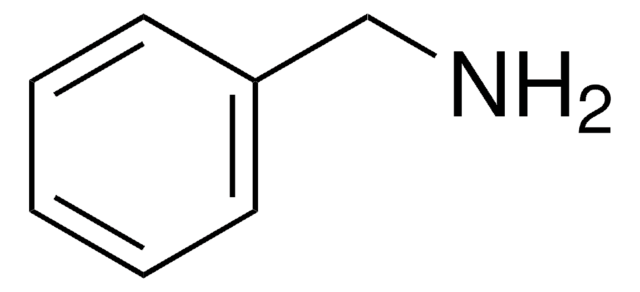247731
Hexamethylendiamin -dihydrochlorid
99%
Synonym(e):
Hexamethylendiamin -dihydrochlorid
Anmeldenzur Ansicht organisationsspezifischer und vertraglich vereinbarter Preise
Alle Fotos(3)
About This Item
Lineare Formel:
H2N(CH2)6NH2 · 2HCl
CAS-Nummer:
Molekulargewicht:
189.13
EG-Nummer:
MDL-Nummer:
UNSPSC-Code:
12352100
PubChem Substanz-ID:
NACRES:
NA.22
Empfohlene Produkte
Qualitätsniveau
Assay
99%
mp (Schmelzpunkt)
256-257 °C (lit.)
Löslichkeit
water: freely soluble
Funktionelle Gruppe
amine
SMILES String
Cl.Cl.NCCCCCCN
InChI
1S/C6H16N2.2ClH/c7-5-3-1-2-4-6-8;;/h1-8H2;2*1H
InChIKey
XMVQMBLTFKAIOX-UHFFFAOYSA-N
Allgemeine Beschreibung
Die Toxizität von Hexamethylendiamin-dihydrochlorid wurde bereits untersucht. Hexamethylendiamin-dihydrochlorid ist auch unter den Bezeichnungen 1,6-Diaminohexan-dihydrochlorid, 1,6-Hexamethylendiamin-dihydrochlorid, 1,6-Hexylendiamin-dihydrochlorid oder 1,6-Diamino-n-hexan-dihydrochlorid bekannt. Hexamethylendiamin-dihydrochlorid erzeugt bei der Fusion von 1:6-Di-(N3-cyano-N1-guanidino)-hexan polymere Diguanide.
Signalwort
Warning
H-Sätze
Gefahreneinstufungen
Eye Irrit. 2 - Skin Irrit. 2 - STOT SE 3
Zielorgane
Respiratory system
Lagerklassenschlüssel
11 - Combustible Solids
WGK
WGK 3
Flammpunkt (°F)
Not applicable
Flammpunkt (°C)
Not applicable
Persönliche Schutzausrüstung
dust mask type N95 (US), Eyeshields, Gloves
Hier finden Sie alle aktuellen Versionen:
Besitzen Sie dieses Produkt bereits?
In der Dokumentenbibliothek finden Sie die Dokumentation zu den Produkten, die Sie kürzlich erworben haben.
Kunden haben sich ebenfalls angesehen
Charles Hebert
Toxicity report series, 24, 1-D8-1-D8 (1993-03-01)
1,6-Hexanediamine (HDA) is an aliphatic amine that is produced in large volumes in the United States. HDA is widely used as a corrosion inhibitor in lubricants and as an intermediate in the industrial synthesis of paints, resins, inks, and textiles.
850. Bisdiguanides having antibacterial activity.
Rose FL andSwain G.
Journal of the Chemical Society, 4422-4425 (1956)
Richard F G Fröhlich et al.
Carbohydrate research, 346(12), 1592-1598 (2011-06-08)
Two simple and reliably accessible intermediates, N-carboxypentyl- and N-aminohexyl-1-deoxy-D-galactonojirimycin were employed for the synthesis of a set of terminally N-dansyl substituted derivatives. Reaction of the terminal carboxylic acid of N-carboxypentyl-1-deoxy-D-galactonojirimycin with N-dansyl-1,6-diaminohexane provided the chain-extended fluorescent derivative. Employing bis(6-dansylaminohexyl)amine, the
Zhiming Zhang et al.
Inorganic chemistry, 47(17), 7615-7622 (2008-08-06)
The reaction between K 12[H 2P 2W 12O 48] and CuCl 2 in a NaCl aqueous solution assisted with organoamines (1,2-ethylenediamine (en), 1,6-hexamethylene diamine (hn), or both) leads to the isolation of three compounds: K 4Na 10[alpha 1-CuP 2W 17O
Wei-Chiang Chen et al.
ACS applied materials & interfaces, 1(8), 1821-1826 (2010-04-02)
Solvent microenvironments are formed around individual single-walled carbon nanotubes (SWNTs) by mixing SWNT suspensions with water-immiscible organic solvents. These microenvironments are used to encapsulate the SWNTs with the monomer sebacoyl chloride. Hexamethylene diamine is then injected into the aqueous phase
Unser Team von Wissenschaftlern verfügt über Erfahrung in allen Forschungsbereichen einschließlich Life Science, Materialwissenschaften, chemischer Synthese, Chromatographie, Analytik und vielen mehr..
Setzen Sie sich mit dem technischen Dienst in Verbindung.










